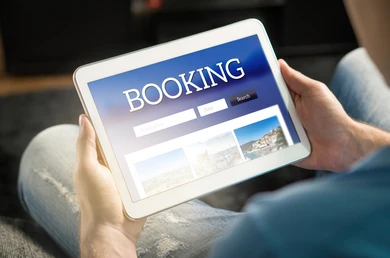
www.socialsail.in
Digital Marketing for Growth:
A Guide for Key Industries
By - Vandana Manhas
www.Socialsail.in
1
www.socialsail.in
Introduction
The rise of digital marketing has been driven by the rapid advancement and widespread adoption of internet technologies, mobile devices, and social media platforms. As consumers increasingly turn to online resources for information, shopping, and entertainment, businesses have shifted their marketing efforts from traditional media to digital channels to better reach and engage their target audiences.
Key factors contributing to the rise of digital marketing include
● Internet and Mobile Penetration:The global increase in internet users and the proliferation of smartphones have expanded the digital landscape, making online marketing more accessible and effective.
● Social Media Growth: Platforms like Facebook, Instagram, Twitter, and LinkedIn offer businesses direct access to large audiences, enabling targeted advertising and real-time customer engagement.
2
www.socialsail.in
● Data Analytics: Advanced analytics tools al ow marketers to track and measure the performance of their campaigns with precision, enabling data-driven decision-making and optimization.
● Content Marketing: The importance of high-quality content has grown, with businesses using blogs, videos, infographics, and podcasts to attract and retain customers by providing valuable and relevant information.
● SEO and SEM: Search Engine Optimization (SEO) and Search Engine Marketing (SEM) have become crucial for increasing visibility and driving traffic to websites through search engines like Google.
Impact on Various Industries
● Retail: E-commerce has transformed the retail industry, with online shopping becoming a major revenue stream. Personalized marketing and targeted ads enhance customer experiences and drive sales.
● Entertainment: Streaming services, social media, and online advertising have reshaped the entertainment industry, al owing for more targeted and interactive marketing campaigns.
3
www.socialsail.in
● Healthcare: Digital marketing in healthcare includes telemedicine, online consultations, and health information dissemination, improving patient engagement and expanding reach.
● Finance: Financial services use digital marketing for online banking, personalized financial advice, and targeted advertising to attract and retain customers.
● Education: Educational institutions leverage digital marketing to promote online courses, webinars, and virtual learning environments, reaching a global audience.
The importance of digital marketing for businesses in the real estate, hotel, hospital, and travel sectors.
1. Real Estate
●
Enhanced Visibility and Reach: Digital marketing enables real estate agents and firms to reach a broader audience through websites, social media, and search engine marketing.
4
www.socialsail.in
●
Virtual Tours and Listings: High-quality images, videos, and virtual tours give potential buyers a comprehensive view of properties online, making it easier to attract interest and close deals.
● Targeted Advertising: Through data analytics and targeted ads, real estate marketers can reach specific demographics, improving lead generation and conversion rates.
2. Hotel Industry
●
Increased Bookings and Direct Sales: Digital marketing helps hotels attract more guests by promoting special offers and booking options directly through their websites and social media channels, reducing dependency on third-party booking platforms.
● Reputation Management: Online reviews and ratings on platforms like TripAdvisor and Google Reviews significantly influence booking decisions. Effective digital marketing includes managing these reviews to build a positive online reputation.
●
Personalized Marketing: Using customer data, hotels can offer personalized experiences and promotions, enhancing guest satisfaction and loyalty.
3. Hospital Industry
5
www.socialsail.in
●
Patient Engagement and Education: Digital platforms provide hospitals with tools to educate and engage patients through informative content, webinars, and social media interactions.
●
Enhanced Accessibility: Online appointment booking systems and telemedicine services have made healthcare more accessible, improving patient experience and operational efficiency.
●
Brand Building: Hospitals can build trust and authority by sharing success stories, patient testimonials, and expert opinions through blogs and social media.
4. Travel Agencies
● Broader Reach and Customer Acquisition: Digital marketing al ows travel agencies to reach a global audience through search engine optimization (SEO), pay-per-click (PPC) ads, and social media marketing.
● User-Generated Content and Reviews: Encouraging customers to share their travel experiences and reviews online can significantly influence the decisions of potential clients.
● Customized Travel Experiences: Through data col ection and analysis, travel agencies can offer personalized travel packages and recommendations, enhancing customer satisfaction and loyalty.
6
www.socialsail.in
Overal , digital marketing has revolutionized these industries by increasing reach, improving customer engagement, and enabling personalized and efficient services.
Implementing digital marketing in the real estate, hospitality, healthcare, and travel industries offers substantial benefits by enhancing visibility, customer engagement, and operational efficiency.
For real estate, digital marketing provides broader reach and detailed property showcases through virtual tours and targeted advertising.
Hoteliers benefit from increased direct bookings, reputation management, and personalized guest experiences.
In healthcare, digital marketing facilitates patient education, boosts accessibility through online services, and strengthens brand trust.
Travel agencies gain from an expanded global audience, leveraging user-generated content, and offering tailored travel experiences.
Overal , digital marketing drives growth, improves customer satisfaction, and fosters loyalty across these sectors.
The Digital Marketing Landscape
Digital marketing encompasses various strategies and tools to reach and engage customers effectively. Here are key concepts:
7
www.socialsail.in
1. Websites
● Foundation: A website serves as the central hub for a brand's online presence, providing information about products, services, and contact details.
● User Experience: Wel -designed websites offer easy navigation, fast loading times, and mobile responsiveness to enhance user experience and engagement.
2. Search Engines
● Discovery and Visibility: Search engines like Google and Bing help users find information online. They rank websites based on relevance and quality through complex algorithms.
● Organic Traffic: High search engine rankings drive organic traffic to websites, increasing visibility and potential leads without direct advertising costs.
3. Social Media
● Engagement and Reach: Platforms like Facebook, Instagram, Twitter, and LinkedIn al ow businesses to engage with a broad audience through posts, stories, and ads.
● Community Building: Social media helps build and nurture communities around brands, fostering customer loyalty and advocacy.
4. Content Marketing
● Value Creation: Content marketing involves creating and sharing valuable, relevant content (blogs, videos, infographics) to attract and retain customers.
8
www.socialsail.in
● Authority and Trust: By consistently providing high-quality content, businesses can establish authority in their industry and build trust with their audience.
5. Email Marketing:
● Direct Communication: Email marketing al ows businesses to communicate directly with customers, providing updates, promotions, and personalized content.
● Nurturing Leads: Effective email campaigns can nurture leads through the sales funnel, improving conversion rates and customer retention.
6. SEO (Search Engine Optimization):
● Improving Visibility: SEO involves optimizing a website’s content and structure to improve its ranking on search engine results pages (SERPs).
● Keyword Optimization**: By targeting relevant keywords and improving on-page and off-page factors, businesses can attract more organic traffic.
7. PPC (Pay-Per-Click) Advertising:
● Targeted Advertising: PPC ads appear on search engines and other platforms, where businesses pay each time a user clicks on an ad.
9
www.socialsail.in
● Measurable ROI: PPC provides immediate visibility and measurable results, al owing businesses to track performance and optimize campaigns for better ROI.
The importance of mobile responsiveness and user experience (UX) design.
These concepts col ectively enable businesses to create a cohesive digital marketing strategy, driving traffic, engagement, and conversions.
Mobile Responsiveness and User Experience (UX) Design are critical elements in digital marketing and website development, playing a significant role in user satisfaction, engagement, and conversion rates. Here’s why they are important -
Mobile Responsiveness:
● Growing Mobile Usage: With a substantial increase in mobile internet users, ensuring a website is mobile-friendly is essential. Mobile devices account for a significant portion of web traffic, making responsiveness crucial for reaching a wider audience.
● Improved User Experience: Mobile responsiveness ensures that a website adjusts seamlessly to various screen sizes and devices, providing a consistent and 10
www.socialsail.in
smooth user experience. This reduces bounce rates as users are less likely to leave a site if it’s easy to navigate on their device.
● SEO Benefits: Search engines like Google prioritize mobile-friendly websites in their rankings. A responsive design can improve a site’s search engine optimization (SEO), leading to better visibility and higher organic traffic.
● Increased Engagement and Conversions: A mobile-responsive site facilitates easier interaction with content, leading to higher engagement levels. Users are more likely to take desired actions, such as making purchases or fil ing out forms, on a site that works wel on their mobile devices.
User Experience (UX) Design
● Enhanced Usability: UX design focuses on creating intuitive, efficient, and satisfying interactions for users. This involves clear navigation, fast load times, and accessible design elements, making it easy for users to find what they need and perform desired actions.
● Higher Customer Satisfaction: A positive user experience leads to higher customer satisfaction. When users find a website easy to use and visual y appealing, they are more likely to return, recommend the site to others, and develop brand loyalty.
11
www.socialsail.in
● Reduced Bounce Rates: Good UX design minimizes frustration and confusion, reducing the likelihood that users wil leave the site immediately (bounce). Lower bounce rates contribute to better SEO performance and higher engagement.
●
Competitive Advantage: Businesses that invest in UX design stand out from competitors. A wel -designed user experience can be a key differentiator, attracting and retaining customers in a crowded market.
●
Increased Conversion Rates: UX design optimizes the user journey, making it easier for visitors to complete desired actions such as making a purchase, signing up for a newsletter, or requesting more information. This leads to higher conversion rates and better business outcomes.
In summary, mobile responsiveness and UX design are fundamental to creating effective digital experiences. They not only enhance user satisfaction and engagement but also contribute to better SEO performance, higher conversion rates, and overal business success.
Analytics tools are essential for tracking and measuring marketing performance, providing insights that help businesses optimize their strategies and achieve better results. Here are some key analytics tools commonly used:
1. Google Analytics:
12
www.socialsail.in
Overview: One of the most widely used web analytics tools, Google Analytics tracks and reports website traffic and user behavior.
Key Features:
●
Audience Insights: Understand who your visitors are, including demographics, interests, and geographic locations.
● Behavior Analysis: Monitor how users interact with your site, what pages they visit, and how long they stay.
● Acquisition Reports: Track where your traffic is coming from (e.g., organic search, social media, paid ads).
● Conversion Tracking: Measure goal completions such as form submissions, purchases, and sign-ups.
2. Social Media Insights:
Facebook Insights:
● Audience Demographics: Get data on your fol owers’ age, gender, and location.
●
Engagement Metrics: Track likes, shares, comments, and overal engagement on posts.
● Page Performance: Analyze the performance of different types of content and overal page growth.
Twitter Analytics:
13
www.socialsail.in
● Tweet Performance: Monitor impressions, engagements, and clicks for each tweet.
● Fol ower Insights: Understand your fol owers’ interests, demographics, and growth over time.
Instagram Insights:
● Content Performance: Track the reach, impressions, and engagement of your posts and stories.
● Audience Metrics: Analyze your fol owers’ demographics and activity patterns.
LinkedIn Analytics:
● Page Views and Engagement: Monitor page visits, unique visitors, and engagement with your content.
● Fol ower Demographics: Get insights into the industries, job titles, and locations of your fol owers.
3. Google Search Console:
Overview: A free tool that helps monitor and maintain your site’s presence in Google Search results.
Key Features:
14
www.socialsail.in
● Search Performance: Track keywords, impressions, clicks, and average positions in search results.
● Index Coverage: Ensure your site’s pages are indexed correctly and troubleshoot indexing issues.
● Mobile Usability: Identify and fix issues affecting your site’s mobile performance.
4.Email Marketing Analytics:
Tools like Mailchimp, Constant Contact, and HubSpot:
● Open Rates and Click-Through Rates (CTR): Measure how many recipients open your emails and click on links.
●
Bounce Rates: Track how many emails were not delivered successful y.
● Subscriber Behavior: Analyze how subscribers interact with your emails, including which links are most popular.
5.Customer Relationship Management (CRM) Systems: Tools like Salesforce, HubSpot CRM, and Zoho CRM:
● Lead Tracking: Monitor the journey of leads through the sales funnel.
● Sales Performance: Analyze sales data, deal progress, and revenue forecasts.
● Customer Insights: Gain a deeper understanding of customer interactions and behavior patterns.
6. Heatmap Tools:
Tools like Hotjar and Crazy Egg:
15

www.socialsail.in
● Visual Insights: See where users click, scrol , and spend the most time on your website.
● User Behavior Analysis: Identify areas of your site that need improvement to enhance user experience.
These analytics tools col ectively provide a comprehensive view of marketing performance across various channels. By leveraging these insights, businesses can make data-driven decisions to refine their strategies, improve user engagement, and increase conversions.
Digital Marketing for Hotel Industry Importance of a Visual y Appealing and Informative Hotel Website with Booking Functionality 16
www.socialsail.in
A hotel website serves as a crucial touchpoint for potential guests, and its design significantly impacts their booking decisions.
A visual y appealing website with high-quality images and a user-friendly layout enhances the user experience, making it easier for visitors to explore room options, amenities, and local attractions. Informative content that addresses guests' needs and questions can build trust and interest.
Integrating a seamless booking functionality ensures a convenient, frictionless process for users to check availability, compare rates, and make reservations directly on the site, reducing reliance on third-party platforms and increasing direct bookings.
3. SEO Strategies for Hotels
● Optimizing for Location-Based Keywords: Incorporate specific location-based keywords throughout the website to attract guests searching for accommodations in a particular area. This includes city names, neighborhood landmarks, and nearby attractions.
● Highlighting Amenities: Emphasize unique amenities and services in your SEO strategy.
Use relevant keywords to describe facilities such as pools, spas, restaurants, and event spaces to attract targeted searches.
● Leveraging Travel Review Platforms: Encourage satisfied guests to leave positive reviews on platforms like TripAdvisor, Yelp, and Google Reviews. These reviews boost your hotel's online reputation and improve search engine rankings.
4. Content Marketing for Hotels
17
www.socialsail.in
● Blog Posts Featuring Local Attractions: Create engaging blog content that highlights local attractions, events, and hidden gems. This positions your hotel as a knowledgeable resource and attracts guests interested in exploring the area.
● Travel Tips: Share practical travel tips, such as packing advice, itineraries, and local customs. This content can drive organic traffic and enhance guest experience planning.
● Showcasing Hotel Facilities and Guest Experiences: Use blog posts to showcase your hotel's facilities, special offers, and guest testimonials. Highlighting real guest experiences can build trust and attract more bookings.
5. Social Media Marketing for Hotels
● Instagram Stories Highlighting Hotel Amenities: Use Instagram Stories to showcase different aspects of your hotel, such as room tours, dining options, and wel ness facilities. Stories provide a dynamic way to engage fol owers with daily updates and promotions.
● Behind-the-Scenes Glimpses: Share behind-the-scenes content to humanize your brand and build a connection with potential guests. This could include staff introductions, preparation for events, or day-to-day operations.
● Engaging with Guests: Actively engage with guests on social media by responding to comments, sharing user-generated content, and hosting interactive sessions like Q&A or live tours.
6. Paid Advertising Strategies for Hotels
18
www.socialsail.in
● Targeted Ads on Social Media: Utilize targeted advertising on platforms like Facebook and Instagram to reach specific demographics, such as travelers interested in luxury accommodations or family-friendly hotels. Tailor ads based on user interests and behaviors.
● Ads on Travel Booking Platforms: Advertise on travel booking platforms like Expedia, Booking.com, and TripAdvisor to increase visibility among users actively searching for accommodations. These platforms offer advanced targeting options to reach potential guests.
7. Email Marketing for Hotels
● Promotional Offers: Send out regular emails featuring exclusive deals, discounts, and promotional offers to entice subscribers to book directly through the hotel's website.
● Special Packages: Highlight special packages, such as weekend getaways, romantic escapes, or holiday specials. These packages can cater to different guest segments and drive bookings during off-peak times.
● Loyalty Programs: Promote your loyalty program through personalized emails that reward repeat guests with points, upgrades, and special perks. Personalized guest communication can enhance customer relationships and encourage repeat bookings.
8. Reputation Management for Hotels
19
www.socialsail.in
● Responding to Online Reviews: Actively monitor and respond to online reviews on platforms like TripAdvisor, Google Reviews, and social media. Addressing both positive and negative feedback shows guests that you value their opinions and are committed to improving their experience.
● Addressing Guest Concerns: Promptly address any concerns or complaints raised by guests. Offering solutions or compensation where appropriate can turn a negative experience into a positive one.
● Showcasing Positive Feedback: Highlight positive reviews and testimonials on your website and social media channels. Showcasing happy guest experiences can build trust and attract new customers.
9. Influencer Marketing for Hotels
● Col aborating with Travel Bloggers: Partner with travel bloggers and influencers to reach their fol owers through authentic and engaging content. Sponsored blog posts, Instagram takeovers, and YouTube videos can showcase your hotel to a wider audience.
● Social Media Partnerships: Engage influencers to create content highlighting their stay at your hotel, including detailed reviews, beautiful photos, and personal stories. This type of content can drive awareness and interest among potential guests.
Digital Marketing for Real Estate Industry
20

www.socialsail.in
Importance of a User-Friendly Real Estate Website A user-friendly real estate website is crucial for attracting and retaining potential buyers and sel ers. Key elements include:
1. High-Quality Listings:
●
Detailed Information: Comprehensive listings with high-quality images, detailed descriptions, and key property features enhance user trust and engagement.
● Search Functionality: Advanced search filters al ow users to easily find properties that meet their criteria, improving their browsing experience.
2. Virtual Tours:
21
www.socialsail.in
● Immersive Experience: 360-degree virtual tours and video walkthroughs provide an immersive experience, al owing potential buyers to explore properties remotely.
● Increased Engagement: Virtual tours can significantly increase user engagement and interest, leading to more inquiries and faster sales.
3. Local Area Guides:
● Community Insights: Local area guides offer valuable information about neighborhoods, schools, amenities, and local attractions, helping buyers make informed decisions.
● SEO Benefits: These guides also improve SEO by incorporating local keywords and providing relevant, useful content that attracts search traffic.
SEO Strategies for Real Estate Websites
Effective SEO strategies can help real estate websites rank higher in search engine results, driving more organic traffic. Key strategies include: 1. Optimizing for Relevant Keywords:
● Keyword Research: Identify and use keywords that potential buyers and sel ers are searching for, such as “homes for sale in [city]” or “best real estate agents in [area].”
● On-Page SEO: Optimize meta titles, descriptions, headers, and content with relevant keywords to improve search engine rankings.
22
www.socialsail.in
2. Location Targeting:
● Local SEO: Focus on local keywords and phrases to target users searching for properties in specific areas. Create location-specific pages for different neighborhoods or cities.
● Google My Business: Optimize your Google My Business profile to appear in local search results and Google Maps.
3. Building Backlinks:
● Quality Over Quantity: Focus on obtaining high-quality backlinks from reputable websites, such as local news sites, real estate blogs, and industry publications.
● Guest Posting: Contribute articles to relevant blogs and websites to build authority and generate backlinks to your site.
Content Marketing for Real Estate Agents
Content marketing helps real estate agents establish authority, attract traffic, and engage potential clients. Effective strategies include: 1.Blog Posts:
23
www.socialsail.in
● Educational Content: Write informative blog posts about the home buying and sel ing process, market trends, and real estate tips.
● SEO-Friendly: Optimize blog posts with relevant keywords to attract organic traffic.
2. Market Updates:
● Timely Information: Provide regular updates on the local real estate market, including trends, pricing, and inventory levels.
● Expert Insights: Share expert analysis and predictions to build credibility.
3. Neighborhood Guides:
● Local Knowledge: Create detailed guides for different neighborhoods, highlighting amenities, schools, transport links, and community features.
● Engaging Content: Use images, maps, and videos to make the guides more engaging and informative.
4. Social Media Content:
● Showcasing Properties: Share high-quality images and videos of listings on platforms like Instagram and Facebook to attract potential buyers.
● Demonstrating Expertise: Post tips, market insights, and success stories to position yourself as a knowledgeable and trustworthy real estate agent.
Social Media Marketing for Real Estate
24
www.socialsail.in
Social media is a powerful tool for real estate marketing, helping agents reach a broader audience and engage with potential clients. Effective practices include: 1. Engaging on Platforms:
● Facebook: Use Facebook to share property listings, market updates, and engage with community groups.
● Instagram: Leverage Instagram’s visual nature to showcase beautiful property photos and virtual tours.
● Nextdoor: Engage with local communities on Nextdoor to build relationships and generate leads from neighbors and nearby residents.
2. Paid Advertising Strategies for Real Estate Paid advertising can significantly enhance visibility and lead generation for real estate agents.
Key strategies include:
1. Targeted Ads on Social Media:
●
Precise Targeting: Use demographic, geographic, and behavioral targeting to reach potential buyers and sel ers on platforms like Facebook and Instagram.
● Retargeting Campaigns: Implement retargeting to engage users who have previously visited your website or interacted with your content.
2. Search Engine Advertising:
25
www.socialsail.in
● Google Ads: Run PPC campaigns on Google to target users searching for real estate-related keywords.
● Local Ad Extensions: Use local ad extensions to highlight your location and attract nearby clients.
Email Marketing for Real Estate
Email marketing remains an effective channel for nurturing leads and maintaining client relationships. Strategies include:
1. Lead Nurturing Campaigns:
● Automated Drip Campaigns: Set up automated email sequences to nurture leads through the buying or sel ing process.
● Personalized Content: Send personalized emails based on user behavior and preferences to increase engagement.
2. Newsletters:
● Regular Updates: Send monthly or bi-weekly newsletters with market updates, new listings, and relevant articles to keep your audience informed.
● Valuable Content: Include tips, success stories, and local news to provide value and maintain subscriber interest.
3. Personalized Communication:
● Tailored Messages: Use CRM data to send personalized messages for birthdays, anniversaries, and other significant dates to build stronger relationships.
26
www.socialsail.in
● Fol ow-Up Emails: After open houses or client meetings, send fol ow-up emails to maintain communication and move leads closer to conversion.
Measuring ROI for Real Estate Digital Marketing Campaigns Measuring the return on investment (ROI) of digital marketing campaigns is essential for understanding their effectiveness and optimizing future efforts. Key metrics and methods include:
1. Tracking Key Performance Indicators (KPIs):
● Leads Generated: Monitor the number of leads generated from different marketing channels.
● Conversion Rates: Track the percentage of leads that convert into clients.
● Cost Per Lead (CPL): Calculate the cost of acquiring each lead to evaluate the efficiency of your marketing spend.
2. Analyzing Website Traffic:
● Traffic Sources: Use tools like Google Analytics to identify where your website traffic is coming from (e.g., organic search, social media, paid ads).
● User Behavior: Analyze how visitors interact with your website, including time spent on site, pages visited, and bounce rates.
3. Evaluating Campaign Performance:
● Ad Metrics: Review metrics for paid advertising campaigns, such as click-through rates (CTR), impressions, and conversions.
27

www.socialsail.in
● Email Campaign Metrics: Analyze open rates, click-through rates, and unsubscribe rates for email marketing campaigns.
4. Client Feedback and Surveys:
● Client Satisfaction: Gather feedback from clients about their experience with your marketing and services.
● Referral Rates: Measure the number of referrals generated to assess client satisfaction and loyalty.
By implementing these strategies and regularly measuring their impact, real estate professionals can optimize their digital marketing efforts, improve ROI, and achieve sustained growth.
Digital Marketing for Hospitals
28
www.socialsail.in
Importance of a User-Friendly Hospital Website A user-friendly hospital website is crucial for several reasons:
● Clear Information: Patients seek specific information about services, doctors, and resources. A wel -organized website with clear navigation helps them find what they need quickly, enhancing their experience and reducing frustration.
● Services Overview: Detailed descriptions of medical services and specialties help patients understand what the hospital offers and make informed decisions about their care.
● Doctor Profiles: Comprehensive profiles with qualifications, specialties, and patient reviews build trust and help patients choose the right healthcare provider.
● Patient Resources: Providing easy access to patient portals, appointment scheduling, bil payment, and educational materials empowers patients to manage their health effectively.
● Mobile Responsiveness: A responsive design ensures that the website is accessible and user-friendly on al devices, catering to the growing number of mobile users.
SEO Strategies for Hospitals
Optimizing for search engines is essential for hospitals to increase visibility and attract patients:
● Medical Keywords: Use specific medical keywords relevant to the hospital’s services, ensuring that content is aligned with what potential patients are searching for. This includes conditions, treatments, and medical procedures.
29
www.socialsail.in
● Local Search Optimization: Optimize for local search by including location-specific keywords, registering with Google My Business, and ensuring consistent NAP (Name, Address, Phone number) information across al platforms. This helps in appearing in local search results and map listings.
● Backlinks: Building authority through backlinks from reputable medical websites, such as medical journals, health blogs, and industry associations, enhances the hospital’s credibility and improves search rankings.
Content Marketing for Hospitals
Content marketing helps hospitals educate and engage with their audience:
● Blog Posts: Regularly publish informative blog posts on various health topics, wel ness tips, and updates on medical advancements. This not only provides value to readers but also improves SEO.
● Doctor Profiles: Highlight doctors’ expertise and achievements through detailed profiles and interviews, helping to build trust and personal connections with patients.
● Informative Videos: Create videos explaining medical procedures, patient testimonials, and health tips. Visual content is highly engaging and can effectively communicate complex information.
Social Media Marketing for Hospitals
30
www.socialsail.in
Social media is a powerful tool for engaging with the community and promoting health awareness:
● Informative Content: Share educational content on patient care, preventive measures, and health tips. This positions the hospital as a knowledgeable and caring authority in healthcare.
● Health Awareness Campaigns: Run campaigns on public health issues, such as vaccination drives, mental health awareness, and disease prevention, to educate the community and promote health initiatives.
● Patient Success Stories: Highlight patient success stories and testimonials (while maintaining HIPAA compliance) to build trust and showcase the positive impact of the hospital’s care.
Paid Advertising Strategies for Hospitals
Paid advertising helps hospitals reach a targeted audience effectively:
● Targeted Ads: Use social media and search engine advertising to target specific demographics and patients seeking particular medical services. This ensures that ads are seen by those most likely to need the hospital’s services.
● Search Ads: Utilize pay-per-click (PPC) ads on search engines for keywords related to medical services offered by the hospital, ensuring visibility at the top of search results for relevant queries.
31
www.socialsail.in
Email Marketing for Hospitals
● Email marketing is a direct way to communicate important information to patients:
● Appointment Reminders: Send reminders to reduce no-shows and ensure patients keep their scheduled appointments.
● Patient Education: Distribute newsletters with health tips, new research, and information on managing chronic conditions to keep patients informed and engaged.
● New Services: Inform patients about new services, programs, and specialties available at the hospital to encourage utilization and retention.
Building Patient Trust and Credibility Online
Establishing trust and credibility online is crucial for patient confidence:
● Showcasing Awards and Affiliations: Display hospital awards, certifications, and affiliations with reputable medical organizations prominently on the website to build credibility.
● Patient Testimonials: Feature positive patient testimonials and reviews to provide social proof of the hospital’s quality of care and patient satisfaction.
● Transparency: Maintain transparency about the hospital’s practices, policies, and patient outcomes to build trust and reliability among current and potential patients.
32

www.socialsail.in
In summary, these strategies col ectively enhance the hospital’s online presence, improve patient engagement, and build a strong reputation, ultimately leading to increased patient trust and loyalty.
Digital Marketing For Travel Agencies
Importance of a User-Friendly Travel Agency Website 1. Search Functionality:
33
www.socialsail.in
● Ease of Use: A robust search function al ows users to quickly find relevant travel options by entering keywords or filters (e.g., dates, destinations, budget).
● Improved User Experience: Enhances navigation and reduces frustration, leading to higher user satisfaction and retention.
2. Customizable Itineraries:
● Personalization: Users can tailor their trips to their preferences, selecting activities, accommodations, and transportation that suit their needs.
● Engagement: Encourages users to spend more time on the site, exploring various options and configurations, increasing the likelihood of booking.
3. Travel Deals:
● Attraction: Highlighting deals and discounts can attract budget-conscious travelers looking for the best value.
● Conversion: Special offers and exclusive deals can prompt quicker decision-making and higher conversion rates.
SEO Strategies for Travel Agencies
1. Optimizing for Keywords:
34
www.socialsail.in
● Destination Keywords: Focus on specific locations (e.g., “best hotels in Paris”) to attract travelers searching for information about those places.
● Travel Types: Use keywords related to travel styles (e.g., “luxury safari tours” or
“adventure travel packages”) to target niche markets.
2. Leveraging Travel Review Platforms:
● Reputation Management: Engage with reviews on platforms like TripAdvisor to boost visibility and credibility.
● Content Integration: Incorporate positive reviews and ratings into your website to enhance SEO and build trust with potential customers.
Content Marketing for Travel Agencies
1. Blog Posts on Travel Destinations:
● In-depth Guides: Create comprehensive guides covering the best times to visit, must-see attractions, local culture, and cuisine.
● SEO Benefits: Regularly updated blog content helps improve search engine rankings by providing valuable information that attracts organic traffic.
2. Travel Tips and Curated Lists:
35
www.socialsail.in
●
Practical Advice: Share tips on packing, safety, budgeting, and navigating new destinations. Engagement: Lists like “Top 10 Beaches in the Caribbean” or “Best Family-Friendly Resorts” can capture attention and drive engagement.
3. Travel Guides:
● Detailed Itineraries: Offer downloadable or interactive travel guides that outline detailed itineraries for different types of travelers.
● Added Value: Position your agency as an expert and trusted resource by providing valuable, actionable information.
Social Media Marketing for Travel Agencies
1. Engaging Content:
● Visual Appeal: Use high-quality images and videos to showcase stunning destinations and experiences.
● Storytel ing: Share stories and testimonials from past clients to inspire potential travelers.
2. Travel Inspiration:
● Inspiring Posts: Regularly post about unique destinations, travel experiences, and seasonal trips to keep your audience engaged and inspired.
36
www.socialsail.in
● Interactive Content: Use pol s, quizzes, and questions to engage fol owers and encourage interaction.
3. User-Generated Content:
● Client Photos and Stories: Encourage clients to share their travel photos and stories on your social media channels, creating a sense of community and authenticity.
● Hashtags: Develop branded hashtags to make it easy for customers to share their experiences and for you to find and repost user content.
Paid Advertising Strategies for Travel Agencies 1. Targeted Ads on Social Media:
● Demographics and Interests: Use detailed targeting options to reach specific demographics and interests, such as adventure travelers or honeymooners.
● Retargeting: Implement retargeting campaigns to reach users who have visited your site but haven’t booked yet.
2. Travel Search Engines:
● Visibility: Advertise on travel-specific search engines like Kayak, Expedia, or Google Flights to reach users actively searching for travel options.
37
www.socialsail.in
● Sponsored Listings: Utilize sponsored listings to appear at the top of search results, increasing visibility and click-through rates.
3. Email Marketing for Travel Agencies
Promoting Travel Packages and Deals:
● Exclusive Offers: Send newsletters featuring exclusive travel deals and last-minute offers to entice subscribers to book.
● Personalized Recommendations: Use past booking data to send personalized travel suggestions and packages tailored to individual preferences.
Highlighting Popular Destinations:
● Seasonal Highlights: Promote destinations based on seasons or upcoming events (e.g.,
“Top Winter Getaways”).
● Themed Campaigns: Create themed email campaigns around specific interests, such as adventure travel, luxury escapes, or family vacations.
Building Partnerships with Travel Influencers and Bloggers 1. Col aboration Opportunities:
● Influencer Campaigns: Partner with travel influencers to create authentic content and reach their fol owers, leveraging their credibility and reach.
38
www.socialsail.in
● Sponsored Trips: Offer influencers sponsored trips in exchange for coverage, reviews, and social media posts, providing first hand endorsements of your services.
2. Guest Blogging:
●
Content Sharing: Invite influencers and bloggers to contribute guest posts to your blog, bringing their audience to your site and enriching your content with diverse perspectives.
Offering Personalized Travel Recommendations and Consultations 1. Tailored Experiences:
● Custom Consultations: Provide personalized travel planning services where potential customers can discuss their preferences and get customized itineraries.
● Enhancing Customer Satisfaction: By understanding and catering to individual needs, you enhance the overal travel experience, leading to higher satisfaction and repeat business.
2. Personalized Fol ow-Ups:
● Post-Trip Engagement: Fol ow up with clients after their trips to get feedback and offer recommendations for future travels based on their past preferences and experiences.
●
Building Relationships: Personal touch points help build stronger customer relationships and foster loyalty.
39
www.socialsail.in
By implementing these strategies, travel agencies can significantly enhance their online presence, attract more customers, and provide superior service tailored to the needs and preferences of modern travelers.
The importance of staying updated on digital marketing trends and adapting strategies accordingly.
Staying updated on digital marketing trends and adapting strategies accordingly is crucial for maintaining competitiveness and achieving sustained success in today's fast-paced digital landscape. Here’s why it’s important:
1. Evolving Consumer Behavior:
Consumer preferences and behaviors change rapidly. Staying current with trends ensures that marketing strategies remain relevant and effectively engage the target audience.
2. Technological Advancements:
New technologies and platforms emerge frequently, offering innovative ways to reach and interact with customers. Keeping up with these advancements al ows businesses to leverage the latest tools for more effective marketing.
3. Algorithm Updates:
40
www.socialsail.in
Search engines and social media platforms regularly update their algorithms. Understanding these changes helps optimize content and advertising strategies to maintain visibility and engagement.
4. Competitive Edge:
Staying ahead of digital marketing trends provides a competitive advantage. Businesses that quickly adapt to new trends can outperform competitors and attract more customers.
5. Enhanced Customer Experience:
Adopting new trends often involves using cutting-edge techniques to improve the customer experience, such as personalized marketing, chatbots, and augmented reality. A superior customer experience can lead to higher satisfaction and loyalty.
6. Data-Driven Decisions:
The latest trends often come with new data analytics tools and methodologies. Utilizing these can lead to more informed, data-driven decision-making, enhancing the effectiveness of marketing campaigns.
7. Cost Efficiency:
41
www.socialsail.in
Understanding and implementing the most efficient digital marketing practices can optimize budget al ocation, reducing costs while maximizing ROI.
8. Adaptation to Regulatory Changes:
Digital marketing is subject to regulatory changes, such as data privacy laws (e.g., GDPR, CCPA). Staying updated helps ensure compliance and avoid legal issues.
In summary, keeping abreast of digital marketing trends and adapting strategies is essential for relevance, competitiveness, and efficiency. It enables businesses to better connect with their audience, utilize new technologies, and achieve superior marketing outcomes.
Here are some valuable resources for further learning and ongoing growth in digital marketing:
Online Courses and Certifications
1. Google Digital Garage:
●
Offers free courses on various aspects of digital marketing, including SEO, SEM, and social media marketing.
●
Google Digital Garage(https://learndigital.withgoogle.com/digitalgarage) 42
www.socialsail.in
2. HubSpot Academy:
● Provides free certification courses on inbound marketing, content marketing, email marketing, and more.
● HubSpot Academy (https://academy.hubspot.com/) 3. Coursera:
● Partners with universities and organizations to offer courses on digital marketing, data analytics, and other relevant topics.
4. Coursera Digital Marketing
Courses(https://www.coursera.org/courses?query=digital%20marketing) 5. Udemy:
●
Features a wide range of digital marketing courses, from beginner to advanced levels, often at affordable prices.
● Udemy Digital Marketing (https://www.udemy.com/topic/digital-marketing/) 6. LinkedIn Learning:
● Provides courses on SEO, content marketing, social media strategy, and more, taught by industry experts.
● LinkedIn Learning Digital Marketing
(https://www.linkedin.com/learning/topics/digital-marketing)
●
Industry Blogs and Websites
1.Moz Blog:
43
www.socialsail.in
●
Focuses on SEO and inbound marketing with insights, guides, and best practices.
●
Moz Blog (https://moz.com/blog)
2. Neil Patel's Blog:
●
Offers actionable advice on SEO, content marketing, social media, and more.
●
Neil Patel Blog (https://neilpatel.com/blog/)
3. Search Engine Journal:
●
Provides the latest news, trends, and tips in SEO, PPC, and social media marketing.
●
Search Engine Journal (https://www.searchenginejournal.com/) 4.Social Media Examiner:
●
A leading source for social media marketing advice, research, and how-to articles.
●
Social Media Examiner (https://www.socialmediaexaminer.com/) 5. Content Marketing Institute:
●
Specializes in content marketing strategies, trends, and best practices.
●
Content Marketing Institute (https://contentmarketinginstitute.com/)
●
6. Socialsail
https://socialsail.in/blogs/
Books
44
www.socialsail.in
1. Digital Marketing for Dummies" by Ryan Deiss and Russ Henneberry: A comprehensive guide covering various aspects of digital marketing.
2. Crushing It!" by Gary Vaynerchuk:
Focuses on building a personal brand and leveraging social media.
3. Epic Content Marketing" by Joe Pulizzi: Offers strategies for creating compel ing content that drives business results.
4. Influence: The Psychology of Persuasion" by Robert Cialdini: Explores the principles of persuasion and how they apply to marketing.
Webinars and Podcasts
1. MarketingProfs Webinars:
●
Regular webinars on a variety of digital marketing topics.
●
MarketingProfs (https://www.marketingprofs.com/events/webinars) 2. Social Media Examiner’s Podcast:
●
Weekly episodes on social media marketing strategies and trends.
●
Social Media Marketing Podcast (https://www.socialmediaexaminer.com/shows/) 3. Marketing Over Coffee:
●
A podcast that covers both classic and new marketing tactics.
45
www.socialsail.in
●
Marketing Over Coffee (https://www.marketingovercoffee.com/) Communities and Forums
1. Inbound.org:
●
A community of inbound marketers sharing insights and discussing trends.
●
Inbound.org](https://inbound.org/)
2. Reddit - r/digital_marketing:
●
A subreddit dedicated to digital marketing discussions, tips, and resources.
●
r/digital_marketing](https://www.reddit.com/r/digital_marketing/) 3. GrowthHackers:
●
A community focused on growth hacking and marketing experiments.
●
GrowthHackers](https://www.growthhackers.com/) By leveraging these resources, you can stay updated on the latest trends, continuously improve your digital marketing skil s, and adapt your strategies to achieve better results.
46












